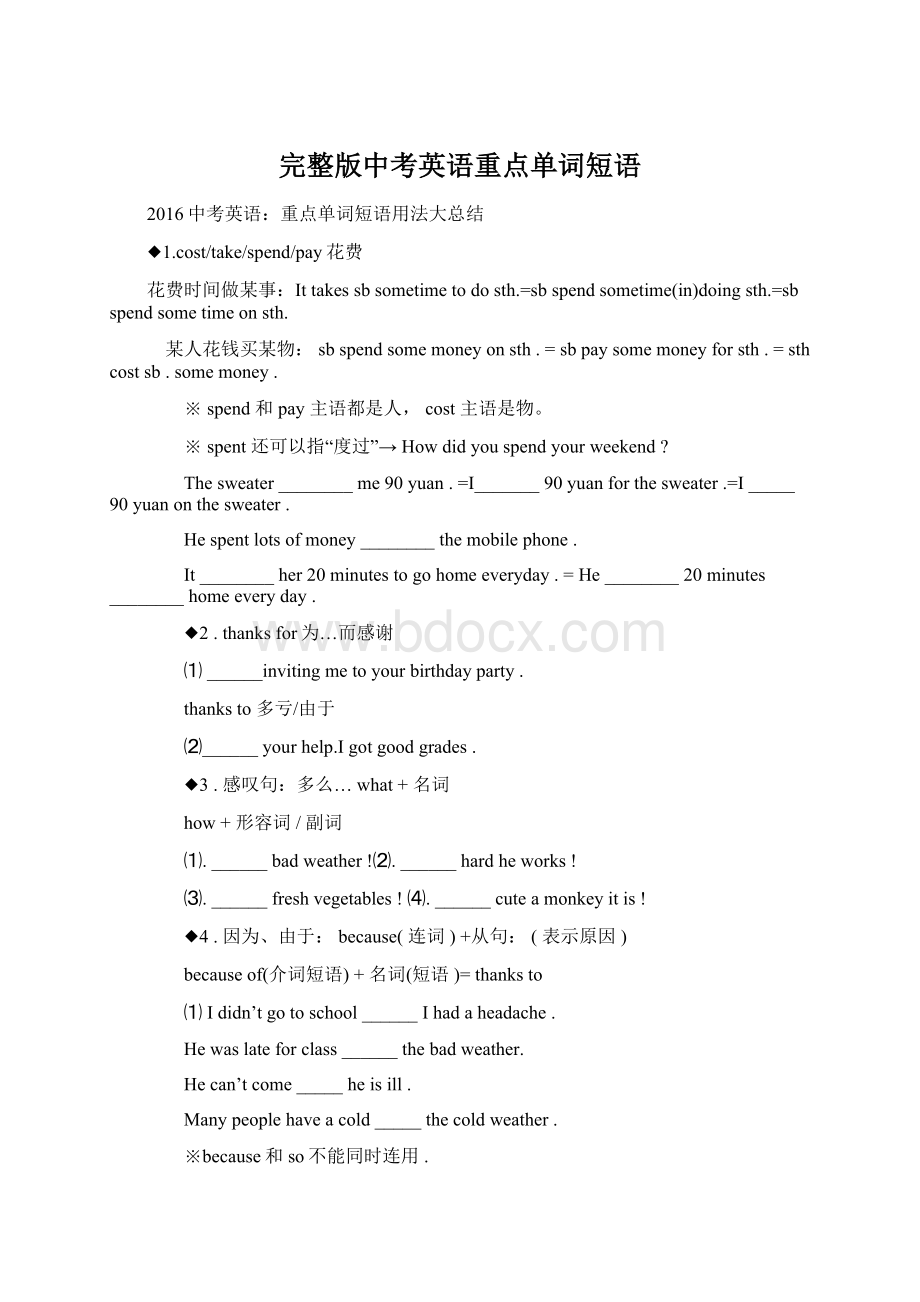完整版中考英语重点单词短语.docx
《完整版中考英语重点单词短语.docx》由会员分享,可在线阅读,更多相关《完整版中考英语重点单词短语.docx(13页珍藏版)》请在冰豆网上搜索。

完整版中考英语重点单词短语
2016中考英语:
重点单词短语用法大总结
◆1.cost/take/spend/pay花费
花费时间做某事:
Ittakessbsometimetodosth.=sbspendsometime(in)doingsth.=sbspendsometimeonsth.
某人花钱买某物:
sbspendsomemoneyonsth.=sbpaysomemoneyforsth.=sthcostsb.somemoney.
※spend和pay主语都是人,cost主语是物。
※spent还可以指“度过”→Howdidyouspendyourweekend?
Thesweater________me90yuan.=I_______90yuanforthesweater.=I_____90yuanonthesweater.
Hespentlotsofmoney________themobilephone.
It________her20minutestogohomeeveryday.=He________20minutes________homeeveryday.
◆2.thanksfor为…而感谢
⑴______invitingmetoyourbirthdayparty.
thanksto多亏/由于
⑵______yourhelp.Igotgoodgrades.
◆3.感叹句:
多么…what+名词
how+形容词/副词
⑴.______badweather!
⑵.______hardheworks!
⑶.______freshvegetables!
⑷.______cuteamonkeyitis!
◆4.因为、由于:
because(连词)+从句:
(表示原因)
becauseof(介词短语)+名词(短语)=thanksto
⑴Ididn’tgotoschool______Ihadaheadache.
Hewaslateforclass______thebadweather.
Hecan’tcome_____heisill.
Manypeoplehaveacold_____thecoldweather.
※because和so不能同时连用.
◆5.来自:
befrom=comefrom
⑴Whereareyoufrom?
=Where______you____________?
⑵HeisfromTibet.=He____________Tibet.
◆6.Howoften对频率提问(多久一次)→回答用表示频率的副词或短语
Howlong对一段时间提问(多久)→回答用表示一段时间的状语
Howsoon对将来时间提问(多久)→回答用in+时间段
Howfar询问多长距离(多长)
⑴-______haveyoubeencollectingthekites?
-Fortenyears.
⑵-______doyougoshopping?
-Sometimes.
⑶-______willyourfathercomeback?
-Intwoyears.
⑷-_____doyouexercise?
-Onceaweek.
⑸-_____isitfromyourhometoschool?
-Abouttenmiles.
⑹-_____areyoustayingthere?
-Twoweeks.
◆7.乘交通工具:
takea/the+交通工具在句中作谓语
by+交通工具=ona交通工具在句中作方式状语
交通工具有:
train/bus/car/taxi/boat/subway/plane…
⑴Hetakesabustobank.=Hegoestobankbybus.=Hegoestobankonabus.
⑵Iwalktoschool.=Igotoschool______.
※骑自行车、马或驴用ride:
rideone’sbike/rideahorse/rideadonkeyinone’scar
◆8.对不起:
Excuseme(劳驾,客套话)
Sorry(表示道歉)
⑴______.WhereisTianfuSquareinChengdu?
⑵–Wouldyoumindcleaningyourroom?
-______.I’lldoitrightaway.
⑶-Don’teatinclass.-_____.MsClark.
⑷_____,isthisthewaytothestation?
◆9.声音:
sound(自然界各种声音)
noise(噪音)
voice(悦耳的声音:
嗓子)
⑴Lucyhasasweet______.⑵That______likeagoodidea.
⑶Don’tmake______.Thebabyissleeping.
◆10.looklike(外貌看起来像…)
belike(性格像…)
⑴Lily__________Lucy.Oh,theyaretwins.
⑵Tony____________amonkeybecauseheiscuteandplayful.
◆11.take…to…带去
bring…to…带来
fetch没有方向性(强调来回)
⑴Tony.______theballhere.Please.
⑵Myfatheroften______me______concertsonSundays.
⑶______yourhomework_____schooltomorrow.
◆12.一些:
some用于肯定句
any用于否定句和疑问句
⑴I’dlike______milk.
⑵–Wouldyoulike______yogurt?
_Thanks.Idon’twant______.
※在一般疑问句中,认为对方的答案会是肯定的,或期望得到对方肯定回答时,也用some.
◆13.多少:
Howmany修饰可数名词复数
Howmuch修饰不可数名词
⑴______juicedoyouwant?
⑵______applesdoyouwant?
⑶-______istheT-shirt?
–It’s30yuan.
※Howmuch可对价钱提问:
Howmucharethepotatoes?
◆14.看:
see强调看的结果
look(at)不及物动词,强调看的动作
watch观看:
比赛、电视、表演、电影
read读,朗读:
看书、看报、看信、看杂志
⑴Don’t______inbed.
⑵Wewill______abasketballgamethisevening.
⑶Please______theblackboard.Everyone.
⑷I______abirdinthetreeyesterday.
※OnSaturdaynight.Isawaninterestingtalkshow.
OnSaturdayevening.severalkidswatchedamovie.watchamovie=gotoamovie
◆15.stopdoingsth停止做某事→Pleasestoptalking.
stoptodosth停下来去做别的事
⑴Thegirlsoonstopped______(cry).⑵Hewastiredandstopped______(have)arest.
◆16.forget/remember后接不定式表示未发生的动作:
△forget/remembertodosth(忘记/记得去做某事)→Heforgottoturnoffthelight.(没有做关灯的动作)Remembertogotothepostofficeafterschool.
forget/remember后接ving表示已发生的动作:
△forget/rememberdoingsth(忘记/记得做过某事)→Heforgotturningoffthelight.(已做过关灯的动作)Don’tyourememberseeingthemanbefore?
◆17.到达…reach+地点
getto+地点reach=getto
arrive+in+大地点
arrive+at+小地点
⑴HereachedLondonyesterday.=He______toLondonyesterday.=He______inLondonyesterday.
⑵Shearrived______thebusstationjustnow.⑶Youshould______(get)homeontime.
※当getto和arriveat/in后接地点副词时,都不加介词。
如:
gethomegetthere省略to
◆18.擅长,在…方面做得好:
begoodat=dowellin.
⑴Sheisgoodatchemistry.=She__________________chemistry.
⑵Niuniuisgoodat______theviolin.=Niuniu______wellin______theviolin.
⑶LucyandLilyaretwingirls.Lucyisbetter______dancingthanLily.butLily___________insingingthanLucy.
◆19.win(赢得)接agame、war、amatch、aprize
beat(打败、战胜)接运动员、球队、对手等。
⑴Whichteam______thefootballmatch?
⑵WangHao______MaLinand______thechampionoftheMen’sSingles.
◆20.借borrowsth.fromsb=borrowsb.sth向某人借某物→borrow借入
lendsth.tosb=lendsb.sth把某物借给某人→lend借出
keep延续性动词,与一段时间连用。
⑴Canyoulendmeyourbike?
=Canyou______yourbike______me?
⑵Youcanborrowsomemoney____yourbrother.=Youcanborrowyourbrother________.
⑶-HowlongcanI______thebook?
-Youcan_____itfortwoweeks.
※类似用法的还有:
buy—haveputon—wearbecome—be
leave—beawayfromopen—beopenbegin—beon
die—bedeadreturn—beback
①becomeHehas______adoctor.
Hehas______adoctorfor10years.
②beginThefilmhas______.
Thefilmhas_________fortenminutes.
◆21.能,会。
beableto
can
※情态动词后面都接动词原形。
⑴Weshould______abletofinishtheworktomorrow.
⑵Ican______(play)theguitar.⑶He______abletoplaychess.
◆22.toomany太多—修饰可数名词复数→Ihavetoomanyrulesinmyhouse.
toomuch太多—修饰不可数名词→Maybeyouhavetoomuchyin.
muchtoo太—后跟形容词或副词原级→Thiscoatismuchtooexpensive.
⑴Eating___________isbadforyourhealth.
⑵It’s____________coldtoday.You’dbetternotgoout.
⑶Thereare____________studentsinthehallways.It’sdangerous.
◆23.have/hasbeento去过某地→HehasbeentoBeijing.(现在不在北京)
have/hasgoneto去了某地→HehasgonetoBeijing.(现在可能在北京,或在去北京的途中)
have/hasbeenin/at在某地
⑴Ihaveever_____________Americatwice.
⑵Hehas____________Beijingfortenyears.
⑶–Whereisyourbrother?
-He____________toHainan.
⑷_____youever____________Disneyland?
◆24.usedtodosth.过去常做某事→Thisriverusedtobeveryclean.
be(get)usedtodoingsth.习惯于做某事→I’mnotusedtogettingupearly.
beusedtodosth=beusedfordoingsth.被用于做某事→Pensareusedforwriting.
⑴XiaoGang__________________afraidofthedark.
⑵Thebroomis____________cleantheroom.=Thebroomis____________cleaningtheroom.
⑶He__________________livingcountryside.Thereisfreshairandsweetwell.
⑷Wood_______________makingpaper.
◆25.belongto+名词/人称代词宾格(属于)
be+名词所有格/名词性物主代词(是)
⑴Itmust______Ning’s.=Itmust_________Ning.
⑵Thepencilmustbe______(my).=Thepencilmustbelongto______(my).
⑶Thisball______tome.=Thisballis______.
◆26.can’t不可能0
表示推测、判断could/might也许、可能50﹪—80﹪
must肯定、一定100﹪
⑴TheCD_____belongtoTony.becausehelikeslisteningtomusic.
⑵Thenotebook______bemine.Ithasmynameonit.
⑶Thetoy______bemygrandpa.Afterall.Heisanoldman.
◆27.bemadefrom(由…制成)看不出原材料
bemadeof(由…制成)看得出原材料
⑴Thetable__________________wood.
⑵Paper__________________wood.
◆28.prefertodosth宁愿做某事
prefersth.tosth.喜欢…而不喜欢…
preferdoingsth.todoingsth.喜欢做…而不喜欢做…
⑴Iprefer______(swim)to______(play)balls.⑵He_______fishtobeef.
⑶Ipreferto______(walk)towork.
◆29.一些表示人的情感或情绪的形容词:
—ed修饰人—ing修饰物
⑴Iwanttogosomewhere______(relaxing/relaxed).
⑵Sheis______inthis______historystory.(interesting/interested)
※interesting(有趣的)—interested(感兴趣的)tiring(累人的)—tired(累的,疲倦的)
boring(令人无聊的)—bored(无聊的)exciting(令人兴奋的)—excited(激动的)
surprising(令人惊讶的)—surprised(惊讶的)
relaxing(令人放松的)—relaxed(放松的)
embarrassing(令人尴尬的;令人为难的)—embarrassed(尴尬的;为难的)
◆30.So+助/系/情态+主语表示肯定意义(…也是如此)
Neither+助/系/情态+主语表示否定意义(…也不)
※它们都属于倒装句。
⑴Mymotherdidn’tgotoschool.____________myfather.
⑵JamescomesfromtheUSA.____________Tom.
⑶MypenpalcanspeakJapanese.____________I.=Me______.
⑷Mysisterisn’toutgoing.____________I.=Me______.
◆31.both两者都
all三者或三者以上都
⑴Thetwins_____aregoodstudents.
⑵Therearelotsofcolorfulflowerson_____sidesofthestreets.
⑶Therearefivepeopleinmyfamily.We______likeplayingsports.Myparents______loveus.Weareveryhappy.
◆32.alone单独,独自一人→Heisaloneathome.
lonely孤独的,寂寞的。
有一定的感情色彩→Helivesalonelylifeinthecountry.
⑴Sometimeshefeelsquite_____becausehehasnofriends.
⑵Shelives_____inthatlargehouse.
◆33inthetree外来的→Isawacatinthetree.
onthetree长在树上的→Therearemanyapplesonthetree.
⑴Howmanymonkeyscanyousee_____thetree?
⑵Therearealotofbananas_____thetree.
◆34.inthewall指在墙体内
onthewall指在墙体表面
⑴Thereisamap_____thewall.
⑵Thereisadoor_____thewall.
◆35.onthebed指物品在床上→Mybagisonthebed.
inbed指人躺在床上→Lilyisillinbed.
⑴Thereisajacket___________.
⑵Ihavetobe________byteno’clock.
◆36.引导结果状语从句:
so和such(如此…以至于…)
so是副词,后接adj和adv.句型:
△so+adj/adv+that从句→Heworkedsohardthathegotthefirstprize.
△so+adj+a(n)+n.+that从句=such+